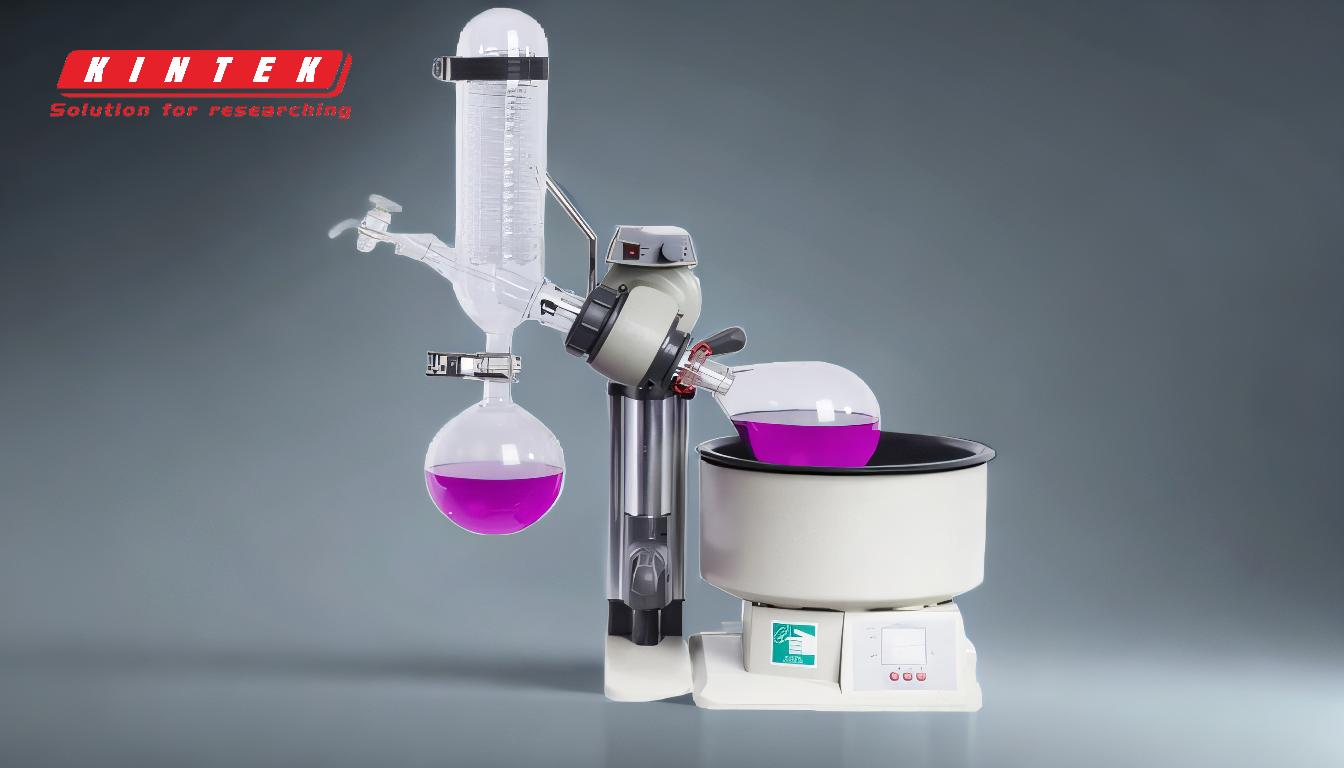Rotary evaporation is a specialized form of vacuum distillation. While both processes involve the separation of components based on their boiling points, rotary evaporation is specifically designed for solvent removal under reduced pressure, retaining the concentrated compound in the original flask. Distillation, on the other hand, typically retains the distillate (condensed vapor). Rotary evaporation uses a combination of heat, vacuum, and rotation to lower the boiling point of the solvent, increase evaporation rates, and separate solvents from compounds efficiently. This makes it a unique and highly effective method for applications requiring precise solvent removal, such as in chemistry, culinary arts, and bartending.
Key Points Explained:

-
Definition and Purpose of Rotary Evaporation:
- Rotary evaporation is a technique used to remove solvents from a sample under reduced pressure.
- The primary goal is to concentrate the compound by evaporating the solvent, which is then condensed and collected separately.
- This process is particularly useful for low-boiling solvents and is widely used in laboratories, culinary applications, and bartending.
-
Comparison with Distillation:
- Distillation: In traditional distillation, the distillate (condensed vapor) is retained as the desired product. This process is often used to purify liquids or separate mixtures based on boiling points.
- Rotary Evaporation: In rotary evaporation, the residue (the concentrated compound) is retained in the original flask, while the solvent is removed and collected. This makes it a form of vacuum distillation tailored for solvent removal.
-
Role of Vacuum in Rotary Evaporation:
- The vacuum system in a rotary evaporator lowers the boiling point of the solvent, allowing it to evaporate at lower temperatures.
- This is crucial for heat-sensitive compounds that might degrade at higher temperatures.
- The vacuum is controlled using a stopcock and is essential for maintaining the reduced pressure required for efficient solvent removal.
-
Mechanism of Rotary Evaporation:
- The process involves placing a round-bottomed flask containing the sample in a heated water bath.
- The flask is rotated to increase the surface area of the liquid, enhancing the rate of evaporation.
- The solvent vapor condenses upon contact with the condensing unit and is collected in a receiving flask, leaving the concentrated compound behind.
-
Applications of Rotary Evaporation:
- Chemistry: Used for solvent removal, concentration of compounds, and purification of samples.
- Culinary Arts: Harvests solid portions of ingredients, removes unwanted flavors (e.g., tannins, bitterness), and extracts essential components.
- Bartending: Extracts evaporated solvents to create concentrated flavors or remove undesirable elements from spirits.
-
Interchangeability of Terms:
- While "evaporation" and "distillation" are often used interchangeably in the context of rotary evaporators, they are not identical.
- Evaporation can occur at nearly any temperature, whereas distillation specifically refers to the process at the maximum temperature of the solvent under given conditions.
- Rotary evaporation is a form of vacuum distillation, as it involves the separation of components based on their boiling points under reduced pressure.
-
Advantages of Rotary Evaporation:
- Efficient solvent removal at lower temperatures, preserving heat-sensitive compounds.
- High evaporation rates due to increased surface area from flask rotation.
- Precise control over the process through adjustable vacuum and temperature settings.
-
Limitations of Rotary Evaporation:
- Not suitable for high-boiling solvents or compounds that are difficult to evaporate.
- Requires careful handling of the vacuum system to prevent contamination or loss of sample.
- Limited to small-scale applications in laboratory settings.
In summary, rotary evaporation is a specialized and highly effective form of vacuum distillation, designed for solvent removal and concentration of compounds. Its unique combination of heat, vacuum, and rotation makes it indispensable in various fields, from chemistry to culinary arts.
Summary Table:
| Aspect | Rotary Evaporation | Traditional Distillation |
|---|---|---|
| Purpose | Solvent removal and compound concentration under reduced pressure. | Purification or separation of liquids based on boiling points. |
| Retained Product | Concentrated compound in the original flask. | Distillate (condensed vapor) is retained. |
| Key Mechanism | Heat, vacuum, and rotation to lower boiling points and increase evaporation rates. | Heating and condensation to separate components based on boiling points. |
| Applications | Chemistry labs, culinary arts, bartending. | Industrial and laboratory-scale purification processes. |
| Advantages | Efficient solvent removal, preserves heat-sensitive compounds, precise control. | Suitable for high-boiling solvents, scalable for industrial use. |
| Limitations | Limited to low-boiling solvents, small-scale applications. | Less efficient for heat-sensitive compounds, requires higher temperatures. |
Need a rotary evaporator for your lab or application? Contact us today to find the perfect solution!












